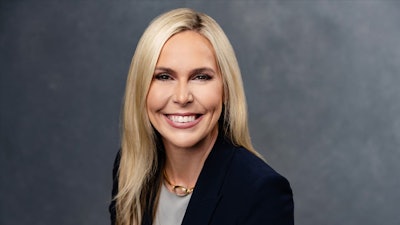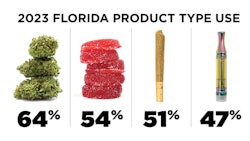
In November, Cannabis Business Times sat down in Las Vegas with Trulieve CEO Kim Rivers to discuss some of the company’s most important endeavors in 2023 and top priorities for 2024. In this conversation, Rivers explains the motivation behind Trulieve—one of the largest multistate cannabis companies in the country—filing an amended tax return and its effort to recover 280E money paid to the IRS, which markets are most important for the company in 2024, and how it is preparing for a potential adult-use launch in Florida and rescheduling.
Noelle Skodzinski: Do you have different business plans depending on when and what the DEA recommendation would be about cannabis rescheduling? (Editor's note: Read CBT’s coverage on cannabis rescheduling for more information and background.)
Kim Rivers: Of course, with the removal of [Internal Revenue Code, Section] 280E, it significantly changes the cash profile of the business and the ability to make investment decisions. So certainly, that's going to alter where exactly we're placing capital.
That being said, I would say that in cannabis, we historically have operated from a posture of “you hope for the best, but you plan for what's known.” And so we have a saying, “control the controllables,” and so we're continuing to control the controllables within our business, and we'll continue to operate in that fashion. The good news for us is we've got great markets, have a great team, are in a great spot. So we're very optimistic regardless of everything else. And since we're in Vegas, I always like to say it feels like we're at that point where we've got a lot of bets on the table and … we're playing roulette, we've got a lot of chips out, and so we just need one to hit. I don't need two, three, four or five. And it's not even that you need it, but you would think at this point with all these opportunities ahead of us, that it would be great if one comes to fruition, and we think we're set up optimally to take advantage of that when it comes.
NS: So that’s a good transition into 280E. Can you talk about the amended tax filing and the strategy behind that?
KR: We filed in October amended tax returns for 2019, 2020 and 2021, and we had to file by that date, or we would've lost the ability to claim basically a refund for 2019. And so it was a straight refund claim. And those are pretty straightforward with the IRS. You're just basically saying, “We don't believe that we owe you this money. We made an error in our filing, so please send us back $143 million. Please and thank you.” [laughs]
And then also what happened in the quarter is because, for two years in a row, we had our hurricane quarter, meaning that we were in Florida when Hurricane Idalia came through. And any business that's directly impacted or headquartered has an automatic tax deferral. So we do not have our estimated tax payment due until February of next year. So that happened in the quarter. The same thing happened to us last year.
Just to be clear, up until this point, we have made all estimated tax payments, fully loaded, is how we're characterizing it, with 280E and our regular tax payments all the way through the second quarter of 2023. Next year we will file our 2022 return—all of those payments have already been made. So we're fully caught up in 2022. We’ll be doing the same thing for 2022, and we'll say with this filing, “You have our money IRS, but we would like some of it back because we do not believe that we owe you for the 280E portion.”
Then when 2023 becomes due, we will have paid partial fully loaded payments for 2023, we'll file that return and say, “Hey, by the way, we're not paying these last two quarters of estimated payments because we don't believe we owe you.” And we'll do the math at that point to see if that's the same thing, if we need money back. And so then this will really hit in 2024, right when we file that return, and we'll be filing that return saying, again, we're taking the position that we do not owe 280E taxes. So it gets a little bit confusing because people are like, “Oh, you're not paying your taxes.” I'm like, “Oh, we paid our taxes.”
Folks just don’t understand the buildup and what we already have in what I like to call the “IRS bank.” We already have in the IRS bank through, again, halfway of 2023. And so obviously returns are on a year delay in terms of when you file.
So, best case scenario, the IRS says, “Oh my gosh, thank you for bringing this to our attention. We agree with you. Here are checks, and we're going to start sending you money.”
Second scenario would be IRS says, “No, we disagree with you. We believe that you owe it.” To which point we would then roll out our legal strategy and take it to court. At that point in time, when we file our case and our briefs, that is when all of the rationale that's been vetted with legal counsel, auditors, consultants, board will come to fruition, and everybody will be able to see exactly the specifics in terms of what is behind the claim.
NS: So you’re not sharing that rationale now?
KR: There's no reason for us to do that, and it would not be to our advantage from a positioning perspective—in terms of we don't want to harm our chances of success ultimately by doing that. We don't want to give anyone more time than they should have to be able to prepare for what we will be arguing.
NS: We are going to have a lot of questions for you later. [laughs]
KR: And that's right. [laughs] If we say it now, then we're giving them potentially a significant amount of time from a lead-time perspective, which that's not helpful for our position.
Michelle Simakis: How soon does the IRS have to respond to the claim that you filed in October? What's their deadline?
KR: They’re on IRS time. I am not going to speak and say that there absolutely is not a deadline. I just don't think it's anything near-term.
MS: How optimistic are you that this will play out in a way that would be beneficial for you and potentially the entire industry?
KR: I think we have a real shot. We wouldn't have gone through the trouble to do all of this if we didn't feel like there was a legitimate claim to be made, which we certainly do.
I think that the other thing to remember is that rescheduling is going to be happening over here in parallel. And I do think that has an opportunity to influence, in some fashion, the outcome. And listen, I think that when you sort of contrast—and this is also where I think folks get a little confused—that peer companies have stopped paying taxes altogether.
They're going to the IRS and saying, “IRS, look at our balance sheet. We actually cannot afford to pay our taxes, so therefore we're entering into a payment plan with you.” And it's basically a negotiated settlement where the IRS says, “Okay, we're going to give you this amount of time to pay all of your taxes, including regular business taxes plus 280E with this amount of penalty and interest.” So that's a full-on negotiated situation.
Now, what could happen—and this is the other thing that was playing into our minds when we decided to go this route—is there could be some sort of a negotiation at some point [when] rescheduling happens. I could go back to the IRS and say, “Hey, IRS, by the way, this just happened. So we need to change our agreement because right now this could be characterized as future taxes owed. I don't necessarily owe you the same fully loaded amount anymore. I need that reduced.”
So the other thing that we didn't want to have happen is, here we are over here paying all of our taxes on time, and then there's an opportunity to have a reduction. The rest of, or a significantly large portion of, the industry takes advantage of that reduction, as they should. And here we are, and we've gotten an A+ on taxes, which that's not necessarily always the best outcome. So it was also, okay, how can we have legitimate claims? How can we preserve our position? How can we be in a spot where even if, for example, we're going through litigation, there's still an opportunity for us to have a liability reduction at some point?
So there's a lot of moving parts. Again, ultimately, we feel like we've got a very strong case. We would love to have an industry-setting precedent that moves forward regardless of a 280E-dependent political finding, and that we can just stand again in an independent posture, but also want to make sure that we're covering all of our bases. So it's a multifaceted approach.
It was strategic. We felt like it was very well thought out, and we’re very excited and anxious to see how it progresses.
MS: Can you talk about the prospects of adult-use legalization in Florida, with state Attorney General Ashley Moody attempting to kill Smart & Safe Florida’s adult-use ballot initiative via a judicial review by the state’s Supreme Court and the November arguments at the state Supreme Court about whether or not it should be allowed to move forward to the ballot? And how much can you prepare for the unknown and try to strategize without knowing exact timelines and when things would really launch? Editor's Note: Trulieve has donated nearly $40 million to Smart & Safe Florida, which is leading the effort to get an adult-use initiative on the 2024 ballot.
KR: We feel as optimistic and positive as we can feel as it relates to adult use.
RELATED: Florida Supreme Court Schedules Oral Arguments for 2024 Cannabis Ballot Measure
And assuming we get a favorable ruling, then the next step is for it to go to the voters, which would be in November. So there's, of course, a lot of work to do to get out the vote and education campaign around why folks should be positively positioned for voting in favor of it.
In the ballot language itself, there's a self-implementation window, which you can do in Florida. So it would be from November, six months, and that's when sales would need to begin. There's a legislative session at the beginning of the year, and there's a legislative session at the beginning of the following year. So two opportunities which we would expect for the legislature to come in and implement. And that's really their job, to come in and round out the infrastructure or the policy around what that specifically will look like in Florida with an adult-use construct.
MS: Should voters approve adult-use, six months is a quick turnaround, but you’re already established and already have a cultivation facility and dispensaries built out. When would you start to pivot and adjust to meet what is usually a huge increase in demand with an adult-use rollout?
KR: We have about 3 million square feet total in Florida of [cultivation] capacity. And so when we pulled Jeffco [a 750,000-square-foot, automated cultivation facility in Jefferson County, Fla., that was fully planted in June] on, we took some of our legacy facilities off, but those are still in the portfolio. They still have lights in them, they still are ready to go. So Jeffco is obviously our crown jewel and is amazing from a quality perspective, cost perspective, efficiency perspective. Not to say that our legacy facilities weren't also great because they were, as it relates to efficiencies as well.
The strategy is pretty straightforward. Jeffco will keep rockin’ and rollin’, and we have the rest of our capacity that we'll be able to quickly turn back on. I can get it turned on and ramped with harvest and product to market in six months. We'll be able to increase supply rapidly, which we'll need to. I mean, because of the size of the market, we believe there'll still be plenty of room for folks to participate.
NS: Do you anticipate that you'll need more than what you have lined up?
KR: It’s 21 million people and a 138 million unique tourist visits, so I think the opportunity is going to be there. I think it's just for us understanding and getting through some of the requirements. What are the restrictions? Are there any restrictions? Is there going to be anything that would hinder potentially the ability to provide access to those folks? … But we would anticipate that there's going to be more than enough demand from a market perspective. And the good news is for us is we have a number of cultivation sites across the state, and so with varying levels of capacity to be built or partial-built capacity across those sites as well.
We have two sites that could house another 750 [thousand square feet] on each, so what would that look like? When would we need to begin that? Those are longer cycle builds. We started the plans on Jeffco three years ago. … We just knew that the market was growing, and we believed that we needed to understand and be able to operate large-scale, efficient facilities for a lot of reasons. And it worked out in terms of a timing perspective.
NS: Could you talk a little bit about the Georgia market and your vision for it?
KR: Georgia is very reminiscent for us of Florida early days. The state is trying to figure out what direction and where it wants to take the program. I think it's certainly helpful to be in market now and to be serving patients, because I think that what happens over time is the stigma starts to fade away, education begins to take over, and we're able to, again—no different than on the federal side—have more specific policy-substantive conversations as we work through programmatic expansion. And so that's really the phase that we're at right now in Georgia.
I think that the pharmacy model is an interesting one. We're going to have to see how that shakes out. [Editor’s note: After this conversation, the DEA notified Georgia pharmacies that they could not dispense cannabis as it is prohibited under federal law.] I think that us then being able to have data and fact-based evidence to come back to the legislature with and say, “Okay, this is now what's happening. Is this what you anticipated? Is this not what you anticipated? This is where we think that the market could go, but these are the things that are going to have to happen in order for the market to get there. And this is a commitment we're willing to make and the investments that we're willing to make as the market grows.” I mean, I remember testifying in front of the Florida Senate on that exact topic, it seems like lifetimes ago at this point in time.
We've been doing tours of our facilities again with state lawmakers in Georgia. And so we're really in the throes of just market building and education, which I would expect to continue for a couple of years. It’s not going to happen overnight. Florida didn’t happen overnight, particularly in more conservative postured states. It's incremental. And that's okay, honestly, because I think that we've seen when it hasn't been incremental, things can be chaotic in a completely different way and then the regulators can get over their skis and then you have a whole different set of problems. Georgia has been a little bit slower on the uptake. But … it does feel like we're starting to build some momentum there.
NS: And also just to have the legislators see that the sky is not going to fall, which is what [happened] when Georgia legalized use of CBD but wouldn't provide access to it, and people were moving out of state then and you could still get arrested for it. It's been a really slow process. So it seems like a huge step and just an ability for them to start to understand this can be done and it can be done safely.
KR: That’s right, and for us to bring some additional form factors in and to be able to show the need. Thankfully the regulatory body there has been really cooperative, which has been great. I've got some optimism going into legislative session there. I mean, we'll see how it plays out, but like I said, it's going to be incremental there. It's going to be a slow build over time.
MS: Looking ahead to 2024, are there any markets you feel are most favorable to expansion or that you’re most excited about?
KR: We're certainly excited about the Ohio market. I think for us, we are very, very, very focused on Florida and then Pennsylvania. When you look at those two markets combined for us, we have 150 stores that we need to flip [to adult-use], which is not nothin’ as we sit here today.
I mean, I think when you look at other medical programs that have transitioned into adult use, I think that the most anyone had in their portfolio at the time was less than 20.
So when you talk about both of those markets, we sit in Pennsylvania with 21 [dispensaries] and Florida, we have 130 today, and we're not done. And so, for us, I give the analogy of this is one of the single biggest, if not the single biggest opportunity that this company will have. And we have to be laser focused, which means saying no to a lot of other opportunities that may exist.
I'm a big Florida State Seminoles fan. And so I'm like, we have the ball at the 10, and you want the touchdown. You don't want to have to settle for the extra points, and you dang sure don't want to fumble the ball. Right? What causes fumbles a lot of times is you're thinking about the next play. You're not focused on the down that's at hand, and we have to focus on the down that's at hand. And I feel very, very passionately about that.
While it’s always fun to talk about the other [opportunities,] I don't think that there's a single opportunity that's out there that won't also be there in two years or a year. I don't think that there's necessarily a rush to position that would have anywhere near the impact that a Florida or a Pennsylvania adult-use initiative impact would have on our business.
MS: How are you talking to your team about this and preparing for it?
KR: You eat a meal one bite at a time. We have a roadmap, and for us in 2024, it’s all about our retail footprint. We need to optimize and make sure that our retail platform is in the best posture that it can be to service the customer in the current environment, but then of course, in an increased demand environment as well. And so we're really focused right now about all aspects of infrastructure that touch the customer because we're very passionate about having a great customer experience and want to make sure that that can transcend and translate into a higher volume environment.
We're about to launch a new website. We're about to launch a new loyalty program. We're looking at our tech stock and our communications channels to consumers. … Making sure that our systems can handle that in a different level of scale. And then all the way back through our demand planning and how is our forecasting model going to change. It's a soup to nuts effort that has already kicked off.
And again, by the way, that benefits our business regardless of what happens with adult use. And it benefits our business, not just in Florida, but across the country. Finding those opportunities where we can make investments and we can lean in in a “regardless” situation is something also that we continue to be focused on.
This conversation has been edited for length, style and clarity.
Noelle Skodzinski is editorial director and Michelle Simakis is editor-in-chief for Cannabis Business Times.


























